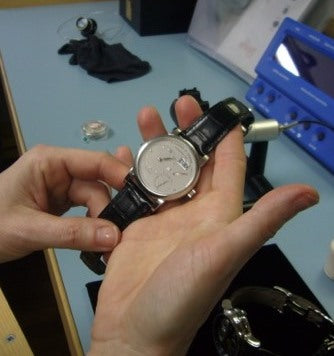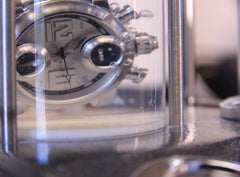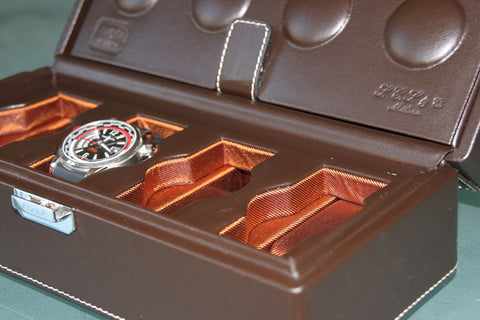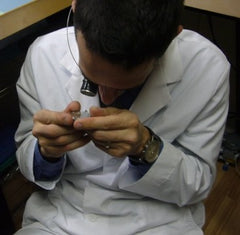Caring for Your Watch
Regular readers of this column are well aware that I approach it with a certain bias: that of the purveyor of luxury timepieces. Here at TimeScapeUSA, we make money when you spend money on caring for your watch. Let's not prance about pretending to be altruists, and God Bless America while we're at it for the free market that allows us to charge a fair price for goods and services. But after the Platinum Card has changed hands and we've sent the client off with watch, box, and papers, what then? Or alternately: maybe Santa was too busy to give you a primer on your new present? It's easy to fall in love, but from the first day there's a certain amount of maintenance involved.
Though it acts against our interests, once again we are here to help. By following a few simple hints, the life of your watch can be extended – if not indefinitely, at least until such a time as you pass it on to one of your more appreciative heirs. The frightening alternative is headache, heartache, and more money for us – specifically more money for me, your humble watchmaker.
Winding Your Wrist Watch
 Every watch is, in essence, a device for acquiring energy, storing it, and returning it to the wearer at a predictable rate. But how does one feed a watch? There is no compatible aisle at PetSmart. Mechanical watches rely on a coiled spring for power, and this must be wound at regular intervals for the watch to function. For a manually wound watch expect to be fully winding your wrist watch once a day upon waking, and before restoring this to your wrist. Watches in general prefer to be wound while held in the hand, not while worn, as this applies fewer sheer forces to the active components. When the watch is fully wound, the crown will cease to turn – continued turning of the crown past this point will break the watch.
Every watch is, in essence, a device for acquiring energy, storing it, and returning it to the wearer at a predictable rate. But how does one feed a watch? There is no compatible aisle at PetSmart. Mechanical watches rely on a coiled spring for power, and this must be wound at regular intervals for the watch to function. For a manually wound watch expect to be fully winding your wrist watch once a day upon waking, and before restoring this to your wrist. Watches in general prefer to be wound while held in the hand, not while worn, as this applies fewer sheer forces to the active components. When the watch is fully wound, the crown will cease to turn – continued turning of the crown past this point will break the watch.
In the case of an automatically wound watch, normal activity during the day should maintain the piece at a reasonable level of power that lasts through the night. If the piece is left to itself for a few days and the power reserve has been depleted you can expect most automatic wound watches to stop. Rest assured your timepiece whether it be manual wound or automatic can be wound by hand as well. Automatic mainsprings include a handy feature: when the spring reaches a fully wound state, it immediately slips a few degrees to release a modicum of tension. This means that the crown will never cease turning, so to refresh an automatic watch that is fully run down, expect to turn the crown 20 to 30 times for full winding of your wrist watch.
Simple quartz watches carry a battery, and for as long as this cells hold a reasonable charge the watch will function. The wearer should expect to replace the cell every 2 to 4 years, and more often as the watch ages. More advanced capacitor-driven quartz pieces can go even longer without cell service.
In the event that it becomes necessary to set a date indication, avoid doing this between 8pm and 2am (as depicted on the piece itself). Doing so chances an interruption of the calendar function itself that might only be rectified by an expensive visit to a technician.
Cleaning Your Watch
A favorite timepiece spends much of its life in direct contact with the body of the wearer, and in the same way the client (at least occasionally) changes socks, the watch must also receive periodic attention and care for cleaning your watch.
 Contemporary timepieces are typically rated water-resistant to at least 50 meters, and this will allow wearer to submerge the piece in water for the purposes of cleaning your watch. Please avoid harsh soaps and solvents, and consider an old toothbrush for persistent grime. Areas of particular interest are the lugs and the case back, though avoid forcing water into the seals of the crown or chronograph pushers. For vintage pieces with no pressure rating or gaskets, one could do worse than a cotton swab barely-moistened with jewelry cleaner.
Contemporary timepieces are typically rated water-resistant to at least 50 meters, and this will allow wearer to submerge the piece in water for the purposes of cleaning your watch. Please avoid harsh soaps and solvents, and consider an old toothbrush for persistent grime. Areas of particular interest are the lugs and the case back, though avoid forcing water into the seals of the crown or chronograph pushers. For vintage pieces with no pressure rating or gaskets, one could do worse than a cotton swab barely-moistened with jewelry cleaner.
Bracelets benefit from regular cleaning, and will accommodate more vigorous actions to drive the damaging dirt from between links. This provides an opportunity to monitor the condition of clasps, buckles, and the “springbar” hardware affixing the bracelet to the case. Wear or damage should be addressed immediately when cleaning your watch.
Rubber can be treated similarly, but avoid wetting leather straps unless previously treated with waterproofing oils. TimeScapeUSA does not recommend their use, as oil – like hand lotion – has a habit of moving past rubber gaskets to accumulate withing the watch itself.
Watch Storage
 Having more than one watch can be a real dilemma. We recommend a padded watch storage case for the timepiece at rest. Buben & Zorweg and Scatola del Tempo make a number of practical, attractive watch storage solutions well suited to both the gentle-person a la maison and the seasoned jetsetter. TimeScapeUSA maintains a stock of watch storage for a single timepiece or a whole collection.
Having more than one watch can be a real dilemma. We recommend a padded watch storage case for the timepiece at rest. Buben & Zorweg and Scatola del Tempo make a number of practical, attractive watch storage solutions well suited to both the gentle-person a la maison and the seasoned jetsetter. TimeScapeUSA maintains a stock of watch storage for a single timepiece or a whole collection.
As we've noted in previous entries, a watch winder is the perfect solution for a lonely single automatic timepiece left on its own. Especially in the case of complicated calendars, this keeps the piece fully fueled, with lubricated oils, accurately wound, and happy. TimeScapeUSA carries a multitude of watch winder brands and models with varying capacities from single units to safes, DIY systems and multi-diverse storage and winding solutions.
The careful (or overly acquisitive) client might feel a longing for the security of a safe deposit box. This is a fine idea with one caveat: the watches should be exercised at least once every few months to insure that lubricants do not begin to harden and dry. Nothing is so disappointing as a brand new watch, never worn and squirreled away in a vault for years, that needs service immediately upon seeing the light.
Watch Service And Maintenance
An uncomfortable topic to be sure, but every fine timepiece will eventually need some more intrusive assistance and service, maintenance or repair. One should expect to service a mechanical watch about every five years – and bear in mind that the cost will be substantial, typically between 10 and 20% of the initial price of the piece. Even quality quartz watches will occasionally need a complete overhaul, service and maintenance when just a new cell won't do. The sad reality is that a watch past its service interval may continue to run, but in doing so cause damage to vulnerable components making for an even more costly repair.
Dive watches, or any other piece seeing regular duty under water, present a special case. Their great vulnerability lies in the rubber seals guaranteeing the case against the intrusion of moisture. Over time, the seals can degrade, so have the case evaluated once a year with at least a dry pressure test. Details regarding water resistance and, permissible depth, and testing can be found in our previous entry on that topic, “Pressure Testing.”
Your Designated Watch Technician
 Finally, stop and visit us (or your designated watch technician) every once in awhile. The wearer reaches a level of intimacy with the piece that can be informative. Does the watch suddenly make a sound? Does the crown or another component suddenly turn with more resistance? Has the timing become erratic, or the power reserve radically diminished? All of these are signs of trouble, and costs can be reduced by responding with celerity to your designated watch technician. The best defense is to become interested in the workings of the watch and learn what makes it tick. One could do worse than to introduce one's self to the staff in the back: watchmaker. Parts are expensive, but handshakes (and the attendant good will) are free of charge and perhaps more valuable. With continued care, service and upkeep consider your designated watch technician like your hairstylist, someone with continued experience with preferences, tastes and the knowledge of the inner workings and know-how of how and what works best for your specific timepiece. Here at TimeScape we strive to service every piece with the utmost care and concern to its owner.
Finally, stop and visit us (or your designated watch technician) every once in awhile. The wearer reaches a level of intimacy with the piece that can be informative. Does the watch suddenly make a sound? Does the crown or another component suddenly turn with more resistance? Has the timing become erratic, or the power reserve radically diminished? All of these are signs of trouble, and costs can be reduced by responding with celerity to your designated watch technician. The best defense is to become interested in the workings of the watch and learn what makes it tick. One could do worse than to introduce one's self to the staff in the back: watchmaker. Parts are expensive, but handshakes (and the attendant good will) are free of charge and perhaps more valuable. With continued care, service and upkeep consider your designated watch technician like your hairstylist, someone with continued experience with preferences, tastes and the knowledge of the inner workings and know-how of how and what works best for your specific timepiece. Here at TimeScape we strive to service every piece with the utmost care and concern to its owner.







Craig Zaligson
Author